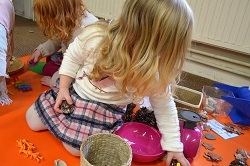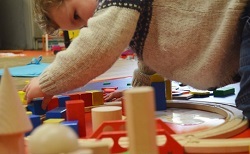Back to Play
 Claire Glennon, qualified educational practitioner, advocate of child-led play and founder of Mini Sparks Play Sessions for pre-school children, talks about the importance of immersive, child-led play.
Claire Glennon, qualified educational practitioner, advocate of child-led play and founder of Mini Sparks Play Sessions for pre-school children, talks about the importance of immersive, child-led play.
“Do you remember, as a child, being so immersed in your play that you didn’t know how so much time had passed? Maybe playing with friends or playing alone? Uninterrupted play which required no validation? This is how play used to look; nobody asking you to spot wildlife, identify a tree or record your thinking.
Now the hot topic is purposeful play. Children everywhere are feeling the pressure to perform and produce tangible results.
But to a child, all play is purposeful. It’s how they unfurl and translate what it means to exist in this rapidly changing world. Play is absolutely vital for early development and research has shown that children who are not given opportunities for play are likely to suffer from mental health issues1.
Most progressive educational philosophies agree that childhood should be a time for exploration and discovery. Child-initiated activities and sustained periods of play contribute towards creative thinking2. Child-led play differs from adult-led in that it is not based on explicit direction, processes or outcomes and all aspects of play are valued. Rather than preconceived adult expectations, it enables the interests of the child.
This is not to say activities offered to invite play cannot be challenging. On the contrary, in order for children to be immersed, the level of challenge must meet the child’s level of skill; this is how learning is most effectively developed. However, the desire for challenge must be intrinsically motivated; children cannot be made to play. Their self-esteem and resilience will almost certainly not develop if they are presented with a contrived activity which is too difficult and of no interest to them3.
 Mini Sparks Play Sessions provide resources and activities which are carefully linked to the early learning goals as laid out by the Statutory framework for the early years foundation stage4. Children who attend sessions are free to become immersed and direct their play within a free-flowing environment. Additionally, sessions provide parents with knowledge and strategies of how to implement opportunities for playful learning at home. There are ideas and sources of information to take away from each session.”
Mini Sparks Play Sessions provide resources and activities which are carefully linked to the early learning goals as laid out by the Statutory framework for the early years foundation stage4. Children who attend sessions are free to become immersed and direct their play within a free-flowing environment. Additionally, sessions provide parents with knowledge and strategies of how to implement opportunities for playful learning at home. There are ideas and sources of information to take away from each session.”
Website: www.minisparks.co.uk
* References:
1. Gray, P., 2011. The Decline of Play and the Rise of Psychopathy in Children and Adolescents. American Journal of Play, 3(4), pp. 443-463.
2. Santer, J., Griffiths, C. & Goodall, D., 2007. Free Play in Early Childhood, Northumbria: National Children’s Bureau.
3. Bruce, T., 2010. Play, the universe and everything!. In: J. Moyles, ed. The Excellence of Play. Maidenhead: Open University Press, pp. 277-290.
4. Department for Education, 2014. Statutory framework for the early years foundation stage, Nottingham: crown copyright 2014.






